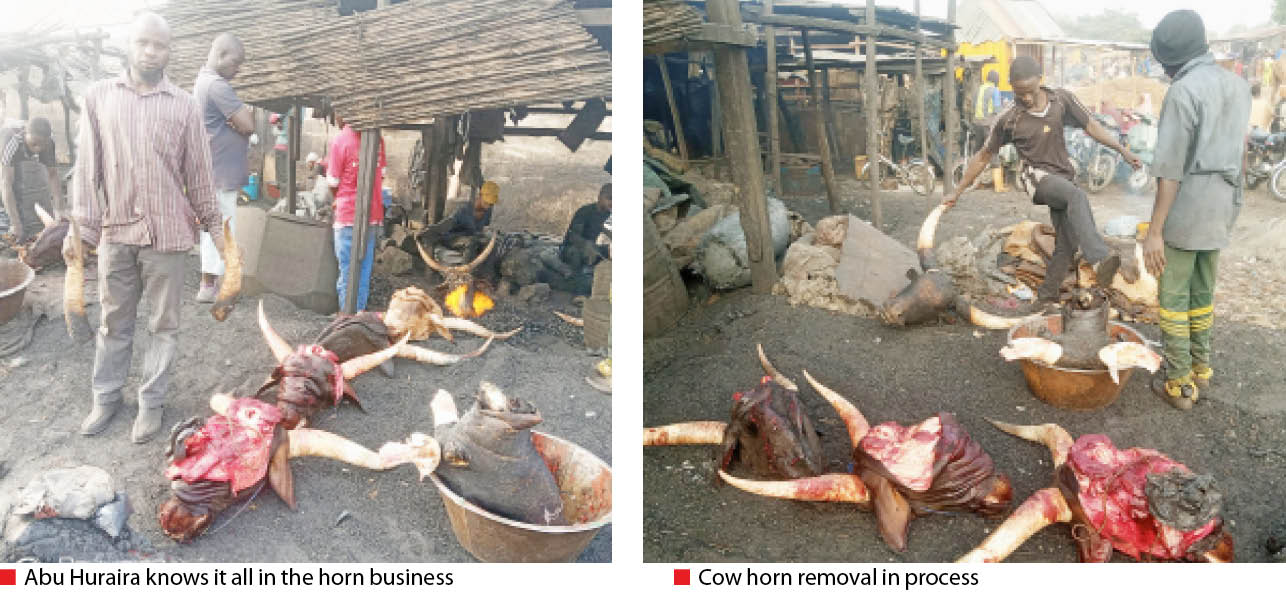How horn, bone business flourishes in Kano
From abattoirs in Kano State to abattoirs across some Northern states, horn and bone business is growing. Butchers and others travel across the region to bring the products to Kano which has become the centre of the business, Daily Trust Saturday reports. Abu Huraira Sani is a household name in the business and his popularity […]

Jazuli poses with samples of black horns at the abattoir
From abattoirs in Kano State to abattoirs across some Northern states, horn and bone business is growing. Butchers and others travel across the region to bring the products to Kano which has become the centre of the business, Daily Trust Saturday reports.
Abu Huraira Sani is a household name in the business and his popularity extends to neighbouring Niger, Chad and Cameroon republics as he visits the countries to buy cow horns and bones in large quantities.
Sani said there were two common types of horns, white and black, with the white coming typically from red cows – which he noted were in small number in Nigeria – hence the need to cross over to neighbouring countries where the cows were predominantly red, while the black horn was from white cows, noting that the black was processed for fertiliser industries in the country and the white, which was more expensive, was mostly exported to China.
He explained that there were also two types of bones; camel bone and cow bone, and that the former was used to produce prayer beads (carbi) and the latter, was processed to produce animal feed, with a kilogramme of cow bone costing N90.
Daily Trust Saturday gathered that there are many items that can be made from cow horns: car bumpers, shoe soles, buttons, decorations for room furniture, jewelry, among several others.

It usually takes Sani 12 weeks to gather a container of white horns. Two pieces of white cow horn (one head) cost between N500 and N600, while the black ones cost N50 to N100.
Sani, who has spent 25 years in the business, said sourcing adequate quantities of horns and bones required many people who would be willing to travel to near and far places, noting that the task of managing the people was one of the challenges in the trade.
In Kaduna, Katsina, Sokoto, Bauchi, Adamawa, Yobe and Borno abattoirs, Sani has also become a household name. He as well frequents the Yemen abattoir in Niger Republic where about 500 cows are slaughtered every day to buy the white horns.
He said, “I usually send my employees out of Kano to source for the materials, and we have colleagues who bring them from neighbouring states. While many of the business partners are upright and trustworthy, some when give them money in advance it would be difficult for them to deliver.
“I have a case with the police involving a business partner who I know very well in Sokoto. He sent a video of ready-made goods, collected N2,800,000 and refused to send the goods. He ignored my calls and messages and I was left with no option than to report him to the police.”
Sani said, “I have four employees, and if I get machines, I will employ more or take the business forward by establishing a full-fledged horns and bones processing company.” Jazuli Usman, another horn trader, said the white horn was more available during the rainy season because red cows were presented to slaughterhouses more during the season due to their fragility.
Like most businesses, the horn business experienced a setback during the COVID-19 pandemic.
However, Usman said that at the peak period of the business, buyers had to wait for the supply and that the waiting usually took weeks and in some cases months before gathering enough for exportation.
While the horn business is going smoothly at the abattoir, the bone trade is facing a challenge as demand from poultry feed companies has drastically reduced.
Sani said, “I have two trailer loads of bones in Maiduguri, two in Kaduna and three in Kano. We keep burning the bones, stocking them and praying for reconsideration of the companies’ decision to purchase the product as they used to do. The only company I know that was processing the cow bone in Sharada Kano has closed for almost nine months now.”
He accused the federal government of their travails by “permitting the poultry feeds processing companies to import a kind of powder which they use instead of the bones in processing the feeds.”
The Chairman of Superior Agricultural Industry Limited, Dr Ali Aliyu, described cow bone as a calcium supplement in poultry feed for growth and development and very useful to layers in building eggshells.
He said, “It equally has Vitamin D which is also helpful in building the poultry bones and consequently their health status.”
Aliyu explained that most of the poultry feed companies in the country were still using cow bone in processing the feeds because it was the cheapest substitute for DiCalcium Phosphate (DCP), a livestock dietary supplement used to combat calcium and phosphorus related deficiencies in livestock, which was costly due to exchange rate.
Aliyu added that whenever the price of DCP reduced, the demand for cow bone would also go down as the companies would go for DCP because it was cleaner and simpler to process, saying, “The cow bone traders need to adjust and improve the way they process the bones. Sometimes we find broken bottles, nails, metals and other garbage inside the bones when we are processing the feeds. And though they burn it before packaging, they should also ensure that the bones are from healthy animals to prevent spreading disease.”
